 BLESS
BLESS
YOUR
HEART BLESS  YOUR
YOUR 
HEART Saving the World
One Covered Dish at a Time WITH RECIPES BY
PATSY CALDWELL AND STORIES BY
AMY LYLES WILSON  2010 by Amy Lyles Wilson, Patsy Caldwell, and Bryan Curtis All rights reserved. No portion of this book may be reproduced, stored in a retrieval system, or transmitted in any form or by any meanselectronic, mechanical, photocopy, recording, scanning, or otherexcept for brief quotations in critical reviews or articles, without the prior written permission of the publisher. Published in Nashville, Tennessee, by Thomas Nelson. Thomas Nelson is a registered trademark of Thomas Nelson, Inc. Photographs by Ron Manville
2010 by Amy Lyles Wilson, Patsy Caldwell, and Bryan Curtis All rights reserved. No portion of this book may be reproduced, stored in a retrieval system, or transmitted in any form or by any meanselectronic, mechanical, photocopy, recording, scanning, or otherexcept for brief quotations in critical reviews or articles, without the prior written permission of the publisher. Published in Nashville, Tennessee, by Thomas Nelson. Thomas Nelson is a registered trademark of Thomas Nelson, Inc. Photographs by Ron Manville
Page design by Mandi Cofer Photos are from Shutterstock. Photos are from iStock.
Photo is from Requelle Raley. Thomas Nelson, Inc., titles may be purchased in bulk for educational, business, fund-raising, or sales promotional use. For information, please e-mail SpecialMarkets@ThomasNelson.com. Library of Congress Cataloging-in-Publication Data Caldwell, Patsy, 1939 Bless your heart : saving the world, one covered dish at a time / by Patsy Caldwell and Amy Lyles Wilson. p. cm.
Includes bibliographical references and index. ISBN 978-1-4016-0052-5 1. Cookery, AmericanSouthern style. 2. CookerySocial aspects. I.
Wilson, Amy Lyles, 1961 II. Title. TX715.2.S68C35 2010
641.5975dc22
2010020991 Printed in the United States of America 10 11 12 13 14 WCT 6 5 4 3 2 1 In honor of my mother, Martha Lee Lyles Wilson, born in 1922 in
Tula, Mississippi, to Eunice and S. T. Lyles. A woman who instructed me
not to put the wooden spoon back in the cake batter after I had licked it,
and who taught me, from that day to this, how to love.
And in memory
of my father, Earl Raymond Wilson (19222000), who introduced me
to smoked oysters and baked quail, and inspired me to live
my life not only as a dreamer but as a doer too. AMY LYLES WILSON This book is for my familymy husband Bill, my son Bryan, my daughter
Kelly and her husband Randy, and my grandchildren Scott and Paige.
And in memory of two of the best cooks I have ever known: my mother,
Irene Foster, and my next-door neighbor Mary Burton Buckner. PATSY CALDWELL CONTENTS Southerners are good at many things. Were good at telling tales, preserving tradition, and greeting strangers on the sidewalk. We mind our manners, honor our heritage, and remember not to wear white after Labor Day. But what Southerners are really good at is food. Just as we are instructed as children not to sass our elders, we learn early on that food is not only for eating. It is also for expressing sympathy, showing appreciation, demonstrating concern, and conveying excitement.
Food that we share with others invites us to do more than ice a cake or bake a casserole. It affords us the opportunity, over and over again, to show we care. Patsy Caldwell has felt at home in the kitchen for as long as she can remember. It started some six decades ago while standing by her mother at the stove, and has since that time led her to feed preachers, executives, politicians, athletes, and brides and grooms as a professional caterer. If you pressed her, I think Patsy would say her favorite mouths to feed are those belonging to her family. Be it her son and daughter and their families when they come for Sunday dinner, or her grandchildren when she hosts the high school seniors for a multicourse, sit-down meal, complete with candles and cloth napkins, to celebrate their proms.
Food is at the heart of the family, says Patsy. But her idea of family is not limited to those she claims as kin. Patsy welcomes all comers, from the undertaker to the sheriff and anyone else who might be hungry for food and fellowship. Such hospitality epitomizes the spirit of Southern cooking in general and the philosophy of the covered dish in particular. Although I am not as skilled in the kitchen, and I am not as quick as Patsy to invite twenty people over for dinner just for fun, I, too, value the power of food to nourish both body and soul. Like many of you, I associate several of my lifes milestones with food: my first father-daughter lunch, just the two of us, when Daddy ordered me a shrimp cocktail at the Russian Tea Room in New York while Mother was out shopping with my two older sisters; the first meal my husband made for me, which tasted not so great but showed me, at age forty-one, what true affection looks like; and the box lunches the women of my childhood church prepared for my family so we could have a bite to eat as we caravanned from the church to the cemetery, a drive of some 160 miles, to bury my father.
Its not just any kind of food, mind you, that enriches the stomach and the heart. Its the kind of food that is prepared with love. While you mix and whip and fold in, youre consoling your childhood friend, now all grown up, who has received a challenging health diagnosis. As you chop and dice and simmer, youre honoring the church organist who is retiring after fifty years in ministry. When you grease the baking dish with the butter wrapper, youre tending the elderly neighbor who doesnt get out much anymore. Because Southerners are a humble people, we dont like to call attention to ourselves while were working our fingers to the bone in the kitchen.
Onion tears, scalded hands, and undercooked eggs are part of the territory. Dont you worry about us; well be fine. Making an extra casserole to put in the freezer just in case, is what we do. Its who we are, mothers who write big hit at potluck on an index card before nestling it back into the recipe box. Daughters who add a note to use more cream in the handmade cookbook passed down from a grandmother, often a small, threering binder full of notes and recipes and newspaper clippings. Such scribblings are more than suggestions for how to cook; they are instructions on how to live.
Regardless of your culinary skills or your food preferences, what it comes down to is this: What might look like a simple chicken potpie sustains the friend who had surgery last week. That strawberry cake youve made a hundred times reassures your elderly aunt that she has not been forgotten even though she cant make it out to the family reunions anymore. Whatever you do, dont underestimate the power of the covered dish to celebrate, commiserate, and console. Maybe it can even save the world. It is our hope that you will take and eatand sharefrom Bless Your Heart, secure in the knowledge that when you feed someone you give one of the greatest gifts a person has to offer: yourself. (Our neighbor Charlotte insists its called Add a Dish, but shes from a really small town Betty Love and I have never heard of.) As a teenager, Betty Love was charged with helping her mother prepare food for the monthly church potluck. (Our neighbor Charlotte insists its called Add a Dish, but shes from a really small town Betty Love and I have never heard of.) As a teenager, Betty Love was charged with helping her mother prepare food for the monthly church potluck.
Her father was head deacon, so they were expected to do more than chop up a head of iceberg and call it a salad. And her mother said it would be sinful to pick up a couple of pies at the Piggy Wiggly and pretend they had baked them. Get it? she would ask Betty Love, smiling. Sinful! I spent more hours than I can remember, says Betty Love, helping my parents haul tuna noodle casseroles, fruit salads with and without poppy seed dressing on account of Mrs. Miles and her finicky dentures, and carrot cakes with half-inch-thick cream cheese icing to the fellowship hall of the First Millerville Anointed Redeemer Church. There Id be, she says, in the back seat of the station wagon, balancing this concoction or that in my lap while Daddy kept eyeing me in the rearview mirror, checking to see if anything had tipped over and if I had thought to bring a dish towel just in case.
Next page
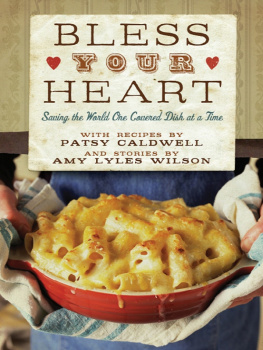
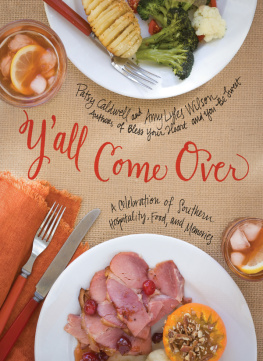


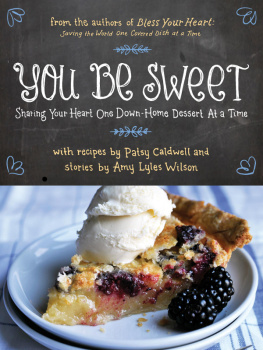

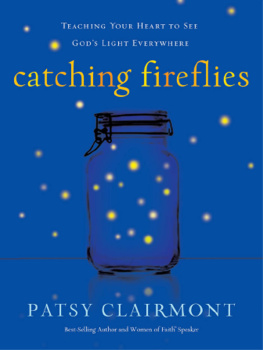

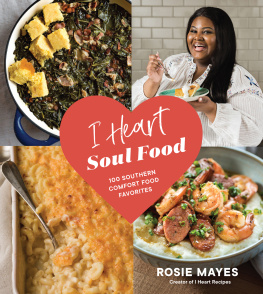
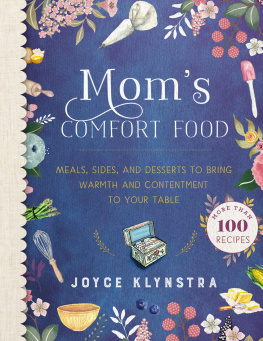
 BLESS
BLESS YOUR
YOUR  2010 by Amy Lyles Wilson, Patsy Caldwell, and Bryan Curtis All rights reserved. No portion of this book may be reproduced, stored in a retrieval system, or transmitted in any form or by any meanselectronic, mechanical, photocopy, recording, scanning, or otherexcept for brief quotations in critical reviews or articles, without the prior written permission of the publisher. Published in Nashville, Tennessee, by Thomas Nelson. Thomas Nelson is a registered trademark of Thomas Nelson, Inc. Photographs by Ron Manville
2010 by Amy Lyles Wilson, Patsy Caldwell, and Bryan Curtis All rights reserved. No portion of this book may be reproduced, stored in a retrieval system, or transmitted in any form or by any meanselectronic, mechanical, photocopy, recording, scanning, or otherexcept for brief quotations in critical reviews or articles, without the prior written permission of the publisher. Published in Nashville, Tennessee, by Thomas Nelson. Thomas Nelson is a registered trademark of Thomas Nelson, Inc. Photographs by Ron Manville